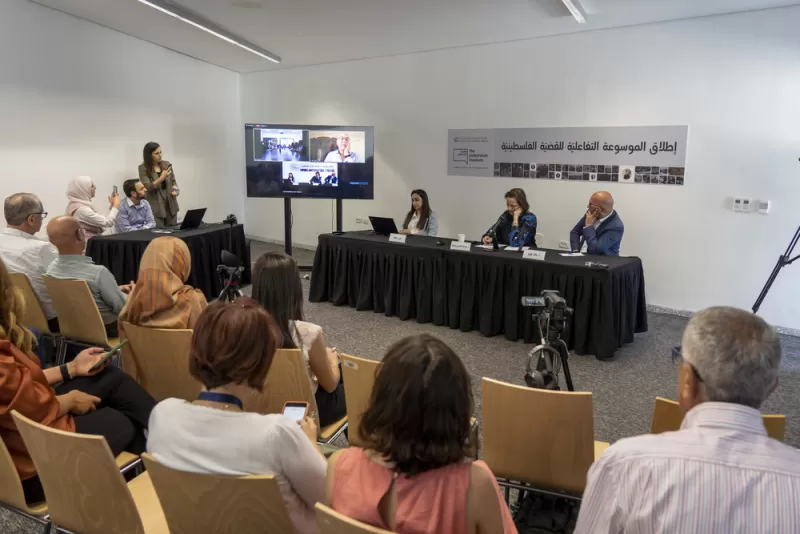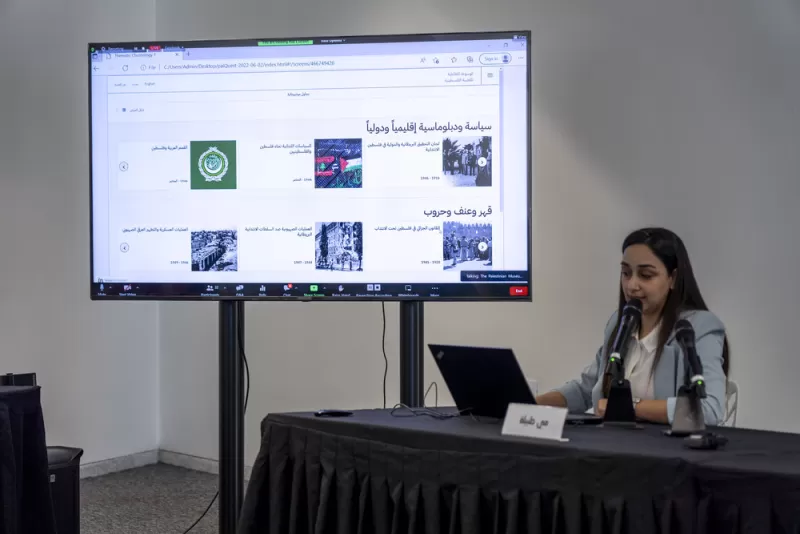Ramallah / Beirut - 2 June 2022
On the occasion of the seventy-fourth commemoration of the Palestinian Nakba and the fifty-fifth commemoration of the 1967 war, the Institute for Palestine Studies and the Palestinian Museum, launched the Interactive Encyclopedia of the Palestine Question at the Palestinian Museum in Birzeit and at the Institute for Palestine Studies in Beirut simultaneously today. The fully bilingual (English–Arabic) platform, the first of its kind, is entirely devoted to the history of modern Palestine, from the end of the Ottoman era to the present. It was developed for use by academics, students, journalists, and the general public.
The Encyclopedia consists of several sections that include a General Chronology with specific dates and selected timelines; Highlights, written by leading academics and experts in the field, that cover important events and institutions, political, military and legal-constitutional developments, as well as crucial aspects of Palestinian cultural, social, or economic life or experience; Biographies of Palestinian intellectuals, artists, leaders, combatants, and politicians who have influenced the history of Palestine since the late nineteenth and early twentieth centuries; Places, the digitized version of the seminal book All That Remains, dedicated to the 418 Palestinian villages destroyed in 1948; and Documents, consisting of hundreds of primary texts, photographs, maps, and charts.
Camille Mansour, the Editor in Chief of the Encyclopedia and the Secretary of the Institute for Palestine Studies, asserted that the project has come to fruition following eight years of preparation and several stages of implementation, including the publication of an interactive timeline at the beginning of 2018 on a transitional platform, “Palestinian Journeys”. Throughout this process, utmost attention has been given to introduce a description of the Palestine Question that is simultaneously committed and objective and to present Palestinians as they are—purposeful actors, and not just victims, who build with both successes and setbacks their political, social, and cultural institutions inside and outside Palestine.
Omar Al-Qattan, Chair of the Board of the Palestinian Museum, shared that “The Palestinian Museum is proud of its strategic partnership with the Institute for Palestine Studies. The Interactive Encyclopaedia is one of the most significant digital platforms of the Museum and the Institute for Palestine Studies, strengthening its mission through innovative programming to disseminate knowledge on Palestine and serve as a reference to students, researchers and Palestinians around the world.”
The Encyclopedia’s word count is currently 800,000 words in both languages; English and Arabic, excluding historical documents. Nearly 100 researchers, editors, translators, programmers, and data entry specialists participated in this endeavor. The Institute for Palestine Studies, in cooperation with the Palestinian Museum, will continue to upgrade and enrich this encyclopedic project.
The launch programme is scheduled to include seminars and lectures during several events in Beirut, Washington D.C., Ramallah and other cities until the end of the year. The platform is funded evenly by the Institute for Palestine Studies and the Palestinian Museum, the Museum’s contribution was made possible by the generous donations of Ossama Khoreibi, Lina Al-Qattan, Nadia Sehweil, Najwa Al-Qattan, Nureddin Sehweil, and Hani Al-Qattan.
To browse the encyclopaedia, visit https://www.palquest.org/
*Notes to Editors
The Palestinian Museum - Non-Governmental Association dedicated to supporting an open and dynamic Palestinian culture nationally and internationally. The Museum presents and engages with new perspectives on Palestinian history, society and culture. It also offers spaces for creative ventures, educational programmes and innovative research.
The Palestinian Museum is a Swiss-registered non-governmental association with a branch in Palestine.
The Institute for Palestine Studies
The Institute for Palestine Studies (IPS) is the oldest institute in the world devoted exclusively to documentation, research, analysis, and publication on Palestinian affairs and the Arab-Israeli conflict. It was established in Beirut in 1963 and incorporated there as a private, independent, non-profit Arab institute unaffiliated with any political organization or government. Throughout the Arab world, IPS is looked upon as the major source of accurate information and analysis on Palestinian affairs and the Arab-Israeli conflict, and as a model of institutional organization and independence.

